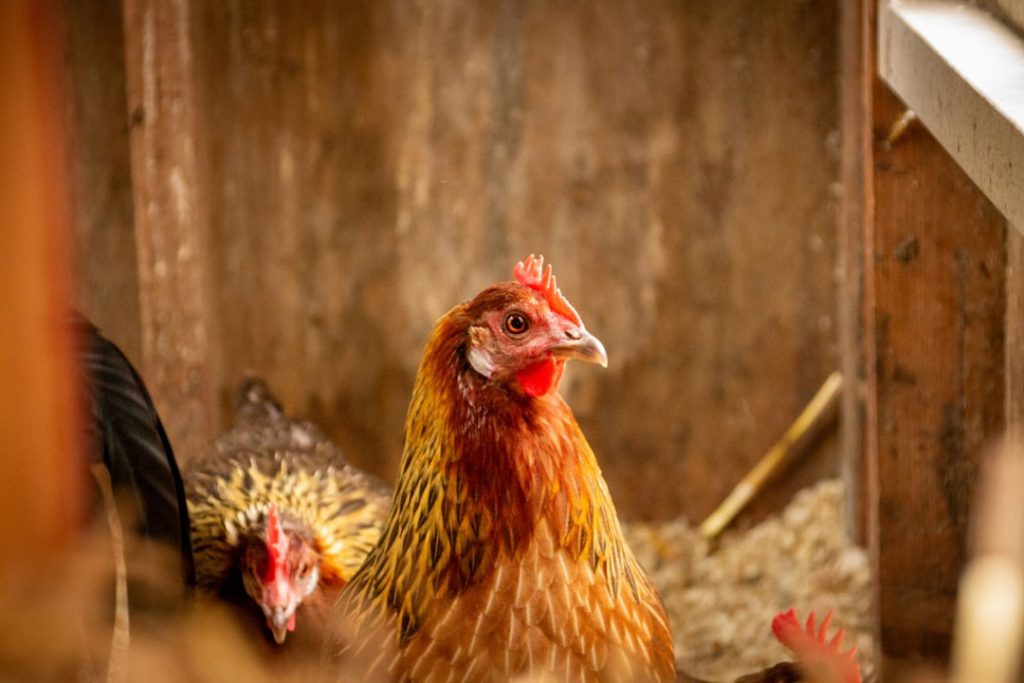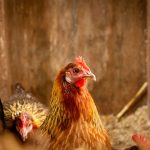Maintaining a healthy chicken flock is crucial for their welfare and productivity. Proper care is essential whether raising chickens for eggs, meat, or companionship. A healthy flock exhibits increased happiness, activity levels, and produces higher quality eggs and meat.
Key factors in flock health include providing a balanced diet, maintaining a clean and secure coop, conducting regular health checks, preventing diseases, managing stress and behavioral issues, and protecting against predators and pests. Chicken-keeping is a fulfilling endeavor that demands dedication and commitment. Adhering to best practices for flock health ensures longevity and contentment for the chickens while providing owners with fresh eggs and meat.
This article will delve into various aspects of chicken care, offering comprehensive information to help keepers maintain a thriving, healthy flock.
Table of Contents
- 1 Providing a Balanced Diet for Your Chickens
- 2 Maintaining a Clean and Safe Coop Environment
- 3 Regular Health Checks and Disease Prevention
- 4 Managing Stress and Behavioral Issues in Chickens
- 5 Protecting Your Flock from Predators and Pests
- 6 FAQs
- 6.1 What are the key factors in keeping a healthy flock of chickens?
- 6.2 What should be included in a balanced diet for chickens?
- 6.3 How often should chickens have access to clean water?
- 6.4 What are the key elements of proper housing for chickens?
- 6.5 How often should chickens receive health checks?
- 6.6 How can chickens be protected from predators?
Key Takeaways
- Keeping a healthy flock of chickens is essential for their well-being and productivity.
- Providing a balanced diet with a mix of grains, protein, and fresh greens is crucial for the overall health of chickens.
- Maintaining a clean and safe coop environment helps prevent diseases and ensures the well-being of the flock.
- Regular health checks and disease prevention measures are important for keeping chickens healthy and disease-free.
- Managing stress and behavioral issues in chickens is essential for their overall well-being and productivity.
Providing a Balanced Diet for Your Chickens
The Importance of a Balanced Diet
A balanced diet is crucial for maintaining a healthy flock of chickens. A well-rounded diet should comprise a mix of grains, protein, vitamins, and minerals to support their overall health and well-being.
The Foundation of a Balanced Diet
The base of a chicken’s diet should consist of high-quality commercial chicken feed specifically formulated to meet their nutritional needs. This feed should contain the right balance of protein, carbohydrates, fats, vitamins, and minerals to support their health and productivity.
Supplementing with Fresh Fruits, Vegetables, and Kitchen Scraps
In addition to commercial feed, chickens can benefit from having access to fresh fruits and vegetables, as well as kitchen scraps such as leftover grains, fruits, and vegetables. These can provide additional nutrients and variety to their diet, supporting their overall health and well-being.
Access to Clean Water
It is essential to ensure that chickens have access to clean water at all times, as water is vital for digestion and overall health. By providing a balanced diet and access to clean water, you can ensure that your chickens have the energy and nutrients they need to stay healthy and productive.
Maintaining a Clean and Safe Coop Environment

Another crucial aspect of keeping a healthy flock of chickens is maintaining a clean and safe coop environment. A clean coop is essential for preventing the spread of diseases and parasites, as well as for promoting good hygiene and overall well-being. Regularly cleaning the coop, including removing soiled bedding, droppings, and debris, is important for keeping the environment clean and sanitary.
It is also important to regularly inspect the coop for any signs of damage or wear, such as holes in the walls or roof, which could allow predators or pests to enter. In addition to cleanliness, it is important to provide a safe environment for your chickens. This includes ensuring that the coop is secure from predators such as foxes, raccoons, and birds of prey.
Installing sturdy fencing and locks on coop doors can help prevent unwanted visitors from entering the coop. Providing adequate ventilation and insulation in the coop is also important for maintaining a comfortable and healthy environment for your chickens. By maintaining a clean and safe coop environment, you can help prevent the spread of diseases and parasites while providing your chickens with a comfortable and secure place to live.
Regular Health Checks and Disease Prevention
Regular health checks and disease prevention are essential for keeping a healthy flock of chickens. Monitoring the health of your chickens on a regular basis can help you identify any potential issues early on and take appropriate action. This includes checking for signs of illness or injury, such as changes in behavior, appetite, or appearance.
It is also important to keep an eye out for any signs of parasites, such as lice or mites, which can cause discomfort and health problems for your chickens. In addition to regular health checks, it is important to take steps to prevent diseases in your flock. This includes practicing good biosecurity measures, such as limiting contact with other poultry flocks and disinfecting equipment and footwear before entering the coop.
Vaccinations can also help protect your chickens from common diseases such as Marek’s disease or Newcastle disease. Providing a clean and sanitary environment, as well as a balanced diet, can also help support the overall health and immune system of your chickens. By regularly monitoring the health of your flock and taking steps to prevent diseases, you can help ensure that your chickens stay healthy and thriving.
Managing Stress and Behavioral Issues in Chickens
Managing stress and behavioral issues in chickens is another important aspect of keeping a healthy flock. Chickens can experience stress from various factors such as overcrowding, changes in their environment, or disruptions in their routine. This can lead to behavioral issues such as feather pecking or aggression towards other chickens.
Providing a spacious and comfortable living environment for your chickens can help reduce stress and promote positive behavior. In addition to providing a suitable living environment, it is important to handle your chickens gently and calmly to minimize stress. Avoiding sudden loud noises or movements around the coop can also help reduce stress in your flock.
Providing enrichment activities such as perches, dust baths, and toys can help keep your chickens mentally stimulated and reduce boredom and stress. By managing stress and behavioral issues in your flock, you can help promote a harmonious living environment while ensuring the overall well-being of your chickens.
Protecting Your Flock from Predators and Pests

Safeguarding Against Predators
Predators such as foxes, raccoons, hawks, and snakes pose a significant threat to chickens and their eggs. To prevent them from gaining access, it is crucial to secure the coop and run area with sturdy fencing and locks.
Deterrents and Early Detection
Installing motion-activated lights or alarms can help deter nocturnal predators from approaching the coop. Regularly inspecting your chickens for signs of parasites, such as feather loss or irritation, can help identify any issues early on.
Controlling Pests and Maintaining a Clean Environment
Providing regular dust baths for your chickens can help control external parasites such as mites. Keeping the coop clean and free from food spills can also help prevent rodents from being attracted to the area. By taking steps to protect your flock from predators and pests, you can help ensure their safety and well-being.
In conclusion, keeping a healthy flock of chickens requires attention to various aspects of their care including providing a balanced diet, maintaining a clean and safe coop environment, regular health checks and disease prevention, managing stress and behavioral issues, and protecting them from predators and pests. By following these guidelines for chicken care, you can ensure that your flock remains healthy, happy, and productive. Additional resources such as books, online forums, and local poultry associations can provide further information on chicken care and support for chicken owners.
With proper care and attention, you can enjoy the benefits of raising a healthy flock of chickens while providing them with a comfortable and fulfilling life.
If you’re looking for tips on how to keep a healthy flock of chickens, you might be interested in this article on creating a garden chicken coop. This article provides valuable information on how to design a coop that not only provides a safe and comfortable environment for your chickens but also integrates seamlessly into your garden, allowing your flock to forage and thrive.
FAQs
What are the key factors in keeping a healthy flock of chickens?
The key factors in keeping a healthy flock of chickens include providing a balanced diet, clean water, proper housing, regular health checks, and protection from predators.
What should be included in a balanced diet for chickens?
A balanced diet for chickens should include a combination of grains, protein, vitamins, and minerals. This can be achieved through commercial chicken feed, kitchen scraps, and access to forage.
How often should chickens have access to clean water?
Chickens should have access to clean water at all times. Water should be changed regularly to prevent contamination and ensure hydration for the flock.
What are the key elements of proper housing for chickens?
Proper housing for chickens should include protection from the elements, adequate space for the flock, nesting boxes for laying eggs, and perches for roosting.
How often should chickens receive health checks?
Chickens should receive regular health checks, ideally conducted by a veterinarian, to monitor for signs of illness or disease. Additionally, flock owners should be observant of any changes in behavior or appearance.
How can chickens be protected from predators?
Chickens can be protected from predators by securing their coop with sturdy fencing, locking them in at night, and using deterrents such as motion-activated lights or sound devices. Additionally, providing a secure outdoor run can offer protection during the day.
Meet Walter, the feathered-friend fanatic of Florida! Nestled in the sunshine state, Walter struts through life with his feathered companions, clucking his way to happiness. With a coop that’s fancier than a five-star hotel, he’s the Don Juan of the chicken world. When he’s not teaching his hens to do the cha-cha, you’ll find him in a heated debate with his prized rooster, Sir Clucks-a-Lot. Walter’s poultry passion is no yolk; he’s the sunny-side-up guy you never knew you needed in your flock of friends!







